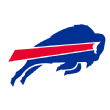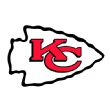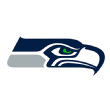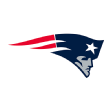With four weeks in the books, it's time to look at who won the NFL's awards for the first quarter of the season. Granted, the Associated Press doesn't yet hand out hardware for the first four games, but this is still a useful time to reflect, and it gives us a marker of what we believed in October to look back at with much better knowledge later in the season.
The first-quarter awards didn't turn out too poorly last year. Most of the picks didn't win, but the award selections paid early attention to the success of players such as Jalen Ramsey and Derek Carr, whose profiles would grow as the season went along. The MVP pick was Matt Ryan, and while I was suspect of Ryan keeping up his hot start for the entirety of the season, the Boston College product did just that on the way to his first MVP award.
So, let's think about the question two ways. First, I'll look through the candidates and make a pick for each award. I'll be trying to emulate the thought process typical voters go through in making their picks as opposed to making my own arbitrary selection. In addition, I'll try to look to the future in the hopes of figuring out whether certain candidates are more/less likely to drop back to the pack.
Defensive Rookie of the Year
While plenty of defensive rookies have put together impressive games so far, few of them have been on the field and playing well for the entire first quarter of the season. Players such as Marshon Lattimore, T.J. Watt and Jarrad Davis have missed games. Carl Lawson and Rasul Douglas have grown into larger roles. If they continue to play well the rest of the way, a few absent snaps in September won't mean much, but in the context of judging the award over four weeks, every possession counts.
The NFL's pick for Defensive Rookie of the Month was cornerback Tre'Davious White, who has played regularly and effectively. Buffalo's first-round pick has been on the field for 256 snaps, second in the league among defensive rookies behind Jets safety Marcus Maye. Teams have gone after the former LSU standout, but White has held his own; his eight passes defensed are tied for the league lead with Chiefs corner Terrance Mitchell. White also returned a fumble for a crucial touchdown in Sunday's win over the Falcons, although he also committed a pass interference penalty on the Buffalo 1-yard line against Mohamed Sanu.
Most of the other candidates are in the secondary. The Jets' safety duo of Maye and sixth overall pick Jamal Adams have exceeded all expectations. Adams' versatility and ability to play multiple roles in a defense lacking playmakers behind the defensive line has been noticeable. Indianapolis' Malik Hooker hasn't been very consistent and is still learning his role within the Colts' scheme, but he's tied for the league lead with three picks. And Green Bay's Kevin King has gone from being buried on the depth chart to taking over as an every-down cornerback over the course of four games; injured starter Davon House might lose his job to a rookie for the second year running after giving way to Jaguars star Jalen Ramsey last year.
 Winner: Tre'Davious White, CB, Buffalo Bills
Winner: Tre'Davious White, CB, Buffalo Bills
Rest of the way
It's extremely difficult for a rookie defensive back to win this award. For one, even top-tier cornerbacks and safeties often struggle as rookies. The other problem is that the voters are often looking for counting stats to make their decision, and in an era when interceptions are at record lows, it's difficult for a defensive back to rack up the picks needed to beat out a pass-rusher. The only defensive back to win Defensive Rookie of the Year since the turn of the century is Marcus Peters in 2015, and that was because Peters tied for the league lead with eight interceptions.
It's possible that Adams, White or any of the other regular defensive backs might make it there, but I wouldn't count on any rookie defensive back to rack up seven or more picks. The smart money would be to pick a front-seven piece to win again. Even there, useful players who don't accrue stats like Oakland's Eddie Vanderdoes and Washington's Jonathan Allen are likely out.
So far, the best candidates are players with missing chunks in their résumé, like Watt and Lawson. Davis looked excellent for the Lions before suffering a concussion against the Giants, and it's unclear when he'll return. Deatrich Wise has been one of the few bright spots for the Patriots. And the most notable defender in this year's class is about to make his NFL debut, as No. 1 overall pick Myles Garrett is set to debut for the Browns after missing the first four weeks of the season with a high ankle sprain.
Of that bunch, I'll go with Lawson; the Bengals inserted him into a larger role before the Packers game in Week 3, and Lawson has racked up 2.5 sacks and five quarterback knockdowns in the two ensuing games. Those are J.J. Watt-caliber numbers, and while I doubt he'll keep up that level of performance, Lawson appears ready to serve as an impactful pass-rusher from the jump for Cincinnati.
Offensive Rookie of the Year
Injuries have deprived us of seeing several promising offensive rookies, with the three wideouts taken among the top nine picks -- Corey Davis, Mike Williams and John Ross -- combining to produce more missed games (nine) than catches (seven, all from Davis) so far. The two quarterbacks taken in the top 10 haven't yet played, with Patrick Mahomes II sitting out and Mitchell Trubisky about to make his debut against the Vikings. Others are joining them on the sidelines; Vikings standout back Dalvin Cook will spend the rest of his season on injured reserve after tearing his ACL, as will Seahawks starter Chris Carson (ankle surgery).
Even with a huge chunk of talent missing, we're spoiled for choice with talented playmakers. Evan Engram has been one of the most productive rookie tight ends in recent memory; the Giants' first-round pick has 200 receiving yards, the third most any rookie tight end has produced through four weeks. Cooper Kupp has been a big part of the Jared Goff resurgence in Los Angeles. Alvin Kamara has been an effective two-way threat for the Saints at running back.
Players such as Leonard Fournette, Christian McCaffrey and Tarik Cohen are in a tier of their own as runners-up, but right now, this is a two-man race between Kareem Hunt and Deshaun Watson. While quarterbacks are more valuable than running backs on the whole and we see strong evidence of voters taking positional scarcity into account for the MVP ballot, there are two reasons I'd choose Hunt over Watson through four weeks.
One is that Watson has really only been great for two games. It's true that his 49-yard touchdown run basically won the game for the Texans against Cincinnati in Week 2, but Watson was otherwise 15-of-24 for 125 yards in a game Houston won 13-9. With a full week of practice, he was markedly better against the Patriots and then a step beyond that in blowing out the Titans last Sunday.
The other is that Hunt has basically been the best player at his position through four weeks. He has 659 yards from scrimmage through four games; Todd Gurley is at 596, and no other player in the league is over 444. Watson leads the league in Total QBR, thanks in part to his running and the myriad pass interference calls he has generated, but the Clemson star has thrown only 114 passes and is 21st in adjusted net yards per attempt (ANY/A). This is going to be a fascinating race as the season goes on, but for now:
 Winner: Kareem Hunt, RB, Kansas City Chiefs
Winner: Kareem Hunt, RB, Kansas City Chiefs
Rest of the way
It's unlikely Hunt will be as explosive on big plays as he has been through four weeks; as I've mentioned before, he has four 50-plus yard plays to his name, which is more than any back has had over a full season since Adrian Peterson during his MVP campaign in 2012. Injuries along the Kansas City offensive line also have to be a concern; Hunt is already temporarily down three starting interior linemen in center Mitch Morse and guards Parker Ehinger and Laurent Duvernay-Tardif.
Hunt should still be productive as long as he stays healthy, but he might lose some ground to the quarterbacks in the race. If Watson continues to play at a high level and the Texans win the AFC South, it will be hard to pick against a quarterback who seemed to turn around a franchise after their brutal run of passers over the past few years. Likewise, if the Bears go on a run with Trubisky under center and sneak into the playoffs, he might do enough to earn a Rookie of the Year nod.
It's still wide-open: Fournette and McCaffrey also could sneak in, given how likely they are to play huge offensive roles on teams with a viable shot of making it to the postseason. I'll go with Hunt, if only because he's out to an enormous lead.
Coach of the Year
We have another two-horse race here. With all due respect to the likes of Jim Caldwell, Vance Joseph and Sean McDermott, each of whom have their teams exceeding expectations, this comes down to the best team in the league against its most surprising squad. It's Andy Reid vs. Sean McVay.
It has been 15 years since Reid last won Coach of the Year, which is pretty remarkable given that he arrived in Kansas City in 2013 to take over the 1-15 Chiefs and started the season 9-0 en route to 11-5 and a playoff berth. (A lesson: Voters remember what you did during the second half of the season way better than the first half.) His Chiefs are the last undefeated team in the league and the consensus best squad in football, a feat Reid is accomplishing despite losing his best player, Eric Berry, to a ruptured Achilles in the season opener.
McVay, meanwhile, has breathed life into a moribund franchise. He has totally revitalized the careers of Jared Goff and Todd Gurley, which seems bizarre to say about players who are in their second and third years, respectively. The 31-year-old former Washington offensive coordinator has been able to pull off a 3-1 start without a 2017 first-round pick and with his best player, Aaron Donald, working his way back into the rotation after missing Week 1 as a result of his holdout.
 Winner: Andy Reid, Kansas City Chiefs
Winner: Andy Reid, Kansas City Chiefs
Reid's record is better than McVay's, and he's working with a more talented team, but I'd take Reid by virtue of strength of schedule. The Chiefs already have beaten the Patriots in New England before dispatching a very game Eagles squad in Week 2. Reid's Chiefs also beat the same Washington team that handed McVay his only loss. The Rams have been impressive, and their win over the Cowboys in Dallas was a public statement, but their other wins are over the Colts and 49ers, who are a combined 1-7.
Rest of the way
Coach of the Year is the toughest award to hand out after four games, if only because it relies upon 16 data points. Jason Garrett ended up winning the trophy last year, and his Cowboys were 3-1 after four games, but two of those wins came over the Bears and 49ers, who were widely expected to be among the worst teams in football. I can't even begin to pick a coach, so let's just stick with Reid.
Comeback Player of the Year
This award is most frequently a nod to whichever NFL player performs the best after returning from a serious injury, which is how Eric Berry and Jordy Nelson won in recent years. If there's not a candidate, the award reverts back to whichever veteran improved dramatically after steadily declining, as was the case with Philip Rivers in 2013. A third archetype would be someone like Marshawn Lynch, but Lynch is averaging 3.4 yards per carry and is on pace to finish with 604 rushing yards, which wouldn't be enough.
At the expense of back-to-form players such as Gurley and DeAndre Hopkins, we have a few stars playing at a high level after suffering serious injuries in 2016, so they'll be duking it out for this nod. Berry's teammate in Kansas City is in consideration, as Justin Houston has made his way back from knee problems and already has four sacks, eight quarterback knockdowns and three pass deflections through four games.
Elsewhere, two stars involved in one of the biggest hits of the 2016 season are shining. Rob Gronkowski is back to his old tricks with the Patriots, although a thigh injury has him questionable for Week 5. Gronk is on pace for an 80-catch, 1,272-yard, eight-touchdown campaign if he makes it through all 16 games. Earl Thomas, meanwhile, is playing at his usual All-Pro level at safety for the Seahawks after returning from a broken leg.
Each of these guys has had an embarrassing moment. Gronkowski dropped an easy touchdown in Week 2 against the Saints. Houston was burned by Vernon Davis on a rare foray into coverage on Monday night in Week 4. Thomas was the closest defensive back when Aaron Rodgers caught the Seahawks with 12 men on the field for a free play in Week 1 and hit Seattle for a rare touchdown on a deep throw up the middle.
 Winner: Earl Thomas, S, Seattle Seahawks
Winner: Earl Thomas, S, Seattle Seahawks
Of the three, I'll go with Thomas, who has had to hold down the fort despite a problem spot at cornerback across from Richard Sherman and a pass rush that has mostly disappeared. The Seahawks have the league's fourth-lowest pressure rate through four games, which could be a problem against Goff and the Rams on Sunday. Goff has the league's best passer rating when unpressured this season.
Rest of the way
Those three players will remain in the running if they stay healthy. A fourth candidate who isn't quite in the running yet is J.J. Watt, who hasn't been his usual self. Through four games, Watt is sackless, although he does have five quarterback hits. It's only the second time in Watt's career that he has gone four games without a sack. He hasn't yet made it to five, which might be a warning for Alex Smith and the Chiefs on Sunday night.
Defensive Player of the Year
As is the case with Defensive Rookie of the Year, the odds are against defensive backs winning Defensive Player of the Year. Sixteen of the past 20 winners of this award are front-seven pieces, and the defensive backs were perennial superstars having interception-driven seasons. Ed Reed and Charles Woodson each led the league in picks the year they won the award, while Troy Polamalu had seven when he won. The only exception was 2007, when Bob Sanders won Defensive Player of the Year despite posting just two interceptions.
The league leaders in interceptions are rookie Malik Hooker and Micah Hyde, who aren't likely to be candidates here. As a result, we have to head to the front seven. The best case I've seen so far for a player who doesn't rush the passer is Ryan Shazier, who has been all over the field, most notably in last week's win over the Ravens. He's second in the league in unassisted tackles (behind C.J. Mosley) and already has five pass breakups, two forced fumbles and a pair of tackles for loss.
In terms of edge rushers, the numbers seem clear. Melvin Ingram has been a wrecking crew in losing efforts for the Chargers, and Khalil Mack has been a one-man show for the Raiders at times. Chandler Jones has stuffed the stat sheet with four sacks, nine quarterback hits and a league-leading five tackles for loss on running plays.
I don't think you can pick anybody else besides DeMarcus Lawrence, though. Lawrence has a two-sack lead on the league with 7.5 in four games. He also leads the league in quarterback knockdowns (11) and already has a pair of forced fumbles. Lawrence's production in four games is identical to what Julius Peppers did over the entirety of last season. Fun time to be in a contract year, right?
 Winner: DeMarcus Lawrence, DE, Dallas Cowboys
Winner: DeMarcus Lawrence, DE, Dallas Cowboys
Rest of the way
Lawrence isn't going to produce the 30-sack season he's on pace to hit, if only because nobody is getting to 30 sacks. Over the past three seasons, Lawrence has averaged just about seven sacks per 12 games, suggesting he'll finish around 14.5 sacks by the end of the season. If the Cowboys remain competitive, he would be a viable candidate for Defensive Player of the Year.
Voters generally tire of the previous winner and don't pick a defending champion to repeat unless he's head-and-shoulders above the competition (like Watt in recent years), so it will be tough for Mack to lay claim to the award. Ingram and Jones might not be on teams good enough to justify an individual award winner. There's still plenty of time to go this season, but Lawrence seems like the best candidate.
Offensive Player of the Year and MVP
These two awards are intertwined, so let's work through them together. Voters have broken from tradition in recent years and started to give the same offensive player both Offensive Player of the Year and MVP, which certainly seems logical to me. In years past, Offensive Player of the Year basically functioned as a runner-up award for the second-best offensive player, or for one who posted transcendent numbers on a mediocre team. I'm open to either possibility.
We can rule out the receivers. The only wideout ever to win Offensive Player of the Year was Jerry Rice, so it's fair to assume we would need an absolutely transcendent season from a wideout or tight end to claim the hardware. Stefon Diggs is on pace to rack up 1,564 receiving yards and 16 touchdowns, but when you remember that Calvin Johnson's 1,964-yard season wasn't enough to win Offensive Player of the Year, we can't credibly think about a wide receiver unless somebody goes nuts.
There are two running backs who could figure into the voting given how far ahead they are of their halfback brethren in terms of yards from scrimmage and touchdowns, but they're also competing with their respective quarterbacks. Do you go for Hunt or Alex Smith, who's completing 76 percent of his passes and has thrown for eight touchdowns without a pick? Should voters choose Gurley or Goff, who leads the league in yards per attempt and has thrown seven touchdowns against one pick?
In both cases, I think the running back is the better candidate. I've mentioned this in my columns, but since Week 2, Smith has basically been his old self; over that time frame, he has averaged 6.1 air yards per attempt, right in line with his 2016 mark of 6.5 air yards per throw. Hunt has been responsible for a league-high 34.6 percent of his team's yards from scrimmage. Likewise, as promising as Goff has been, Gurley has been the focal point of the Rams' offense, scoring seven of Los Angeles' 11 offensive touchdowns. It's impossible to imagine either offense functioning without its star running back.
So, the running backs are in. Let's throw three quarterbacks into the mix. Drew Brees isn't thought of as an MVP candidate because he has been great forever, but he's completing 69.1 percent of his passes, averaging 7.5 yards per attempt, never gets sacked, and hasn't been picked off all season. He's doing all this without Willie Snead, while left tackle Terron Armstead and right tackle Zach Strief are both injured. The Saints are 2-2 with a minimal running game and no defense, last week's shutout aside.
Aaron Rodgers has his own degree of difficulty; he won on Thursday night despite being down the top five tackles on his depth chart, with the Packers moving guard Lane Taylor to left tackle alongside linemen making their first and second career starts. Davante Adams, Randall Cobb and Jordy Nelson have each needed to leave games with injuries. His running game has been nonexistent. Rodgers' receivers have even dropped 4.4 percent of his passes, above the league average of 3.5 percent. No quarterback in the league looks better on the field than Rodgers.
And yet, even at 2-2, there's a strong case for Tom Brady, whose defense is last in DVOA while allowing 30.5 points per game to opposing offenses. In Brady's worst game of the season he threw for 267 yards without an interception in Week 1 against the league's best team while they still had their best defender. He's leading the league in passing yards -- without Julian Edelman.
Let's sort through the candidates. Of the two backs, Hunt is the better choice; he has a 140-yard lead on Gurley in rushing, and voters value rushing yardage more than receiving yardage for backs. Hunt's 659 yards and six touchdowns compare favorably to Gurley's 596 yards and seven touchdowns, and Gurley's four fumbles clear things up even further. Hunt has to finish ahead of Gurley.
As for the quarterbacks, Rodgers' numbers aren't in line with the other two:
Brady and Brees are virtually identical on pass attempts, so there's no question of volume. The numbers put Brady slightly ahead, and I think the story of how and when Brady has performed help his case. He had to lead the Patriots back in Week 3 with a two-minute drill to beat the Texans, including conversions on second-and-20 and third-and-18. Then, last week, Brady led two fourth-quarter touchdown drives to tie the score at 30-30 with 3:14 to go, only for his defense to cost him a shot at overtime.
I went back and forth between Brady and Hunt for more time than I care to admit. Hunt has been the most productive player on the best team in football, but he's a running back. It basically takes 2,000 rushing yards or 25 touchdowns for a back to get in the MVP discussion since the turn of the century, and even that might not be enough. Chris Johnson racked up 2,006 rushing yards and a record 2,509 yards from scrimmage for an 8-8 Titans team in 2009 and didn't get a single MVP vote. Hunt is on pace to hit those marks, with 2,008 rushing yards and what would be a record 2,636 yards from scrimmage. It would certainly help his argument to succeed if the Chiefs do continue to look like the league's best team.
Brady is surprisingly the one who has to fade the concerns about his team's record, although the problems with the Patriots quite clearly have little to do with him and the offense. Despite playing without Edelman and behind a struggling offensive line, the 40-year-old simply hasn't slipped. If his season ended today, Brady would finish with the best ANY/A (9.0 yards per attempt) of his career and the second-best passer rating (116.6) of his tenure, narrowly trailing that legendary 2007 season, in which he hit a 117.2 mark. He's on pace to throw 40 touchdowns without a pick. If that sounds absurd, keep in mind that over his past actual 16 games, Brady has thrown for 38 touchdowns against two interceptions.
When offensive awards are close, ties seem to go to the quarterback. I followed that logic:
 Offensive Player of the Year: Kareem Hunt, RB, Kansas City Chiefs
Offensive Player of the Year: Kareem Hunt, RB, Kansas City Chiefs
 Most Valuable Player: Tom Brady, QB, New England Patriots
Most Valuable Player: Tom Brady, QB, New England Patriots
Rest of the way
If Hunt can't keep generating big plays on seemingly a weekly basis, he'll fall back to the running back pack and drop out of the race. That would hardly be unprecedented: DeMarco Murray ran for 534 yards and five rushing touchdowns through the first four weeks of the 2014 season, yet while he still produced a monster season, his final totals -- 1,845 rushing yards and 13 touchdowns -- netted only two MVP votes. It would be interesting to see whether Gurley would garner any award attention if he actually hit his 28-touchdown pace, but it's more likely he'll regress toward the mean there, too.
There are some long shots I didn't mention. Le'Veon Bell was off to a slow start before he torched the Ravens last week; it would hardly be surprising to see him accelerate into the MVP race with a few 200-yard games from scrimmage. Matthew Stafford is a yard shy of starting 4-0, and while his numbers in Jim Bob Cooter's passing attack aren't always impressive, he has earned his reputation as a quarterback who can steal games late in the fourth quarter. Even someone like Carson Wentz has taken strides, and while he and Torrey Smith continue to struggle to hook up, the Eagles have an offense with big plays to be had. If Philadelphia goes 12-4 and Wentz wins a bunch of close games, he might sneak into consideration.
Of the quarterbacks, I'd probably lean toward Brady and Rodgers over the crowd. It seems likely that the Patriots will figure out their communication problems on defense and get back in the swing of things; it just remains to be seen whether the Pats will do it as soon as their mini-bye following Thursday night's Bucs game or whether it takes until, say, the Week 9 bye. If Bill Belichick and Matt Patricia can figure things out sooner rather than later, chances are that the Patriots go on a serious hot streak and finish the year out in the 13-3 range. If not, a great season from Brady might only be enough to go 10-6, which probably doesn't earn an MVP nod.
Things might be easier for Rodgers, assuming he gets back his tackles relatively soon. The second half of his schedule is far lighter than the first, meaning that we could see the sort of second-half blitz we saw from the longtime Packers starter last season. With Adams thankfully making progress back in practice after the brutal hit he took from Danny Trevathan last Thursday, Rodgers' receiving corps is intact. They already have a one-game lead on the Patriots, albeit in a tougher division.
Narrowly, my prediction is that Brady wins his third MVP award in February. I do, however, reserve the right to change my picks in five weeks when we get to midseason.
